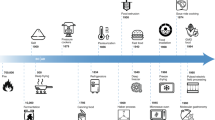Abstract
Trust in the "agro-food" sector has been declining in recent years reflecting a general decline of trust in traditional decision making processes. The introduction of new technologies in the production of foods re-introduces the problem of trust and highlights the parameters affecting its structure and direction. This paper discusses the issue of trust in relation to the introduction of functional foods into the market. Trust is assessed as both a philosophical and a psychological construct with particular emphasis on its communication aspects. The paper ends with specific recommendations for action in the agro-food sector.
Similar content being viewed by others
Notes
Neophobia is the tendency of consumers to avoid or resist unknown foods, a trait that might be particularly strong in relation to novel foods. It has been argued that this tendency might have an evolutionary origin.
Annette Baier (1986); Richard Holton (1994); Karen Jones (1996) Trust as an affective attitude. In: Ethics, vol. 107, pp. 4–25; Russell Hardin (1996) Trustworthiness. In: Ethics, vol. 107, pp. 26–42; and Lawrence Becker (1996).
References
Arrow K (1974) The limits of organization. Norton, New York
Baier A (1986) Trust and antitrust. Ethics 96:231–260
Barber B (1983) The logic and limits of trust. Rutgers University Press, New Brunswick, New Jersey
Beck U (1992) Risk society. Sage, London
Becker L (1996) Trust as noncognitive security about motives. Ethics 107:43–61
Bredahl L (2001) Determinants of consumer attitudes and purchase intentions with regard to genetically modified foods—results of a cross-national survey. J Consumer Policy 24:23–61
Corporatewatch (2000) The next generation of frankenfoods: so-called "functional foods". Report taken from the UK website of Corporatewatch, June 2000
Diplock AT, Aggett PJ, Ashwell M, Bornet F, Fern EB, Roberfroid MB (1999) Scientific concepts of functional foods in Europe: consensus document. Brit J Nutr 81:supplement 1
Earle TC, Siegrist M, Gutscher H (2002) Trust and confidence: a dual-mode model of cooperation. Western Washington University, USA
Earle TC, Cvetkovich G (1995) Social trust: toward a cosmopolitan society. Praeger, New York
Earle TC, Cvetkovich G (1994) Risk communication: the social construction of meaning and trust. In: Brehmer B, Sahlin NE (eds) Future risks and risk management. Kluwer Academic, Netherlands
Euromonitor (2000) Functional foods: a world survey. Euromonitor, London
Frewer LJ, Howard C, Hedderley D, Shepherd R (1996) What determines trust in information about food-related risks? Underlying psychological constructs. Risk Anal16:473–486
Fukuyama F (1995) Trust—the social virtues and the creation of prosperity. Simon and Schuster, New York
Goldberg I (1994) Functional foods, designer foods, pharmafoods, neutraceuticals. Chapman & Hall, London
Heasman M, Mellentin J (2001) Eating and drinking in the risk society—implications of risk for functional food. The functional foods revolution—healthy people, healthy profits? Earthscan, vol 4, pp 79–96, London
Holton R (1994) Deciding to trust, coming to believe. Australa J Philos 72:63–76
Jackson J (2000) Truth, trust and medicine. Routledge, London
Johnson BB, Slovic P (1995) Presenting uncertainty in health risk assessment: initial studies of its effects on risk perception and trust. Risk Anal 15:485–494
Liakopoulos M (2001) The politics of technology assessment. In: Decker M (ed) Interdisciplinarity in technology assessment; implementation and its chances and limits. Springer, Berlin Heidelberg New York
Luhmann N (1979) Trust and power. Wiley, Chichester
Menrad M, Hüsing B, Menrad K, Reiß T, Beer-Borst S, Zenger CA (2000) Technology assessment: functional food. Schweizerischer Wissenschaftsrat, Bern
Midden CJH, Boy D, Einsiedel E, Fjaestadt B, Gaskell G, Liakopoulos M, Miller J, Olsson S, Wagner W (2002) The structure of public perceptions. In: Gaskell G, Bauer M (eds) Biotechnology and the public. Cambridge University Press, Cambridge
O'Neill O (2002) Autonomy and trust in bioethics. Cambridge University Press, Cambridge
Poulsen JB (1999) Danisch consumers' attitudes towards functional foods. MAPP Working paper no 62, 2
Renn O, Levine D (1991) Credibility and trust in risk communication. In: Kasperson RF, Stallen PJM (eds) Communicating risks to the public: international perspectives. Kluwer, Dordrecht
Seligman A (1997) The problem of trust. Princeton University Press, Princeton
Slovic P (1993) Perceived risk, trust, and democracy. Risk Anal 13:675–682
Sztompka P (1999) Trust—a sociological theory. Cambridge University Press, Cambridge
TAB (1999) Functional food – Funktionelle Lebensmittel. Report to the German Parliamentary Office of Technology Assessment, Berlin, Germany
Verbeke W, Viaene J (2001) Consumer attitudes towards functional foods: exploring knowledge, perception and acceptance. Eursafe 2001:401–404
Acknowledgements
We would like to thank Professor C.F. Gethmann for comments on an earlier draft.
Author information
Authors and Affiliations
Corresponding author
Additional information
This paper partly reflects work done with Professor Cees Midden, Technical University of Eindhoven, as part of an expert technology assessment project for the Europaeische Akademie Bad Neuenahr Ahrweiler GmbH.
Rights and permissions
About this article
Cite this article
Liakopoulos, M., Schroeder, D. Trust and functional foods. New products, old issues. Poiesis Prax 2, 41–52 (2003). https://doi.org/10.1007/s10202-003-0032-7
Published:
Issue Date:
DOI: https://doi.org/10.1007/s10202-003-0032-7




